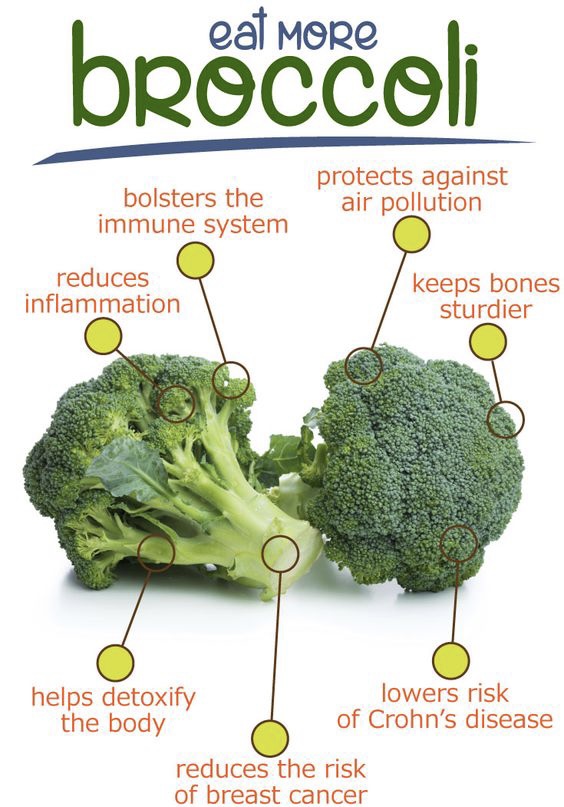| by Admin

Broccoli contains a wealth of nutrients and antioxidants that support many aspects of human health.
Broccoli is a rich source of vitamins, minerals, and antioxidants. Antioxidants can help prevent the development of various conditions.
The body produces molecules called free radicals during natural processes such as metabolism, and environmental stresses add to these. Free radicals, or reactive oxygen species, are toxic in large amounts. They can cause cell damage that can lead to cancer and other conditions.
The body can eliminate many of them, but dietary antioxidants can help.
Improving bone health
Calcium and collagen work together to make strong bones. Over 99% of the body’s calcium is present in the bones and teeth. The body also needs vitamin C to produce collagen. Both are present in broccoli.
Vitamin K has a role in blood coagulation, but some experts have also suggested that it may help prevent or treat osteoporosis. People with low vitamin K levels may be more likely to experience problems with bone formation. Getting enough vitamin K from the diet may help keep the bones healthy.
Boosting immune health
Vitamin C is an antioxidant that provides a range of benefits.
It supports the immune system and may help prevent cancer, cardiovascular disease (CVD), cataracts, and anemia. In supplement form, it may also help reduce the symptoms of the common cold and shorten the time a cold lasts.
Improving skin health
Vitamin C helps the body produce collagen, which is the main support system for body cells and organs, including the skin. As an antioxidant, vitamin C can also help prevent skin damage, including wrinkling due to aging.
Studies have shown that vitamin C may play a role in preventing or treating skin conditions such as shingles and skin cancer.
Aiding digestion
Dietary fiber can help promote regularity, prevent constipation, maintain a healthy digestive tract, and lower the risk of colon cancer.
In 2015, a screening trial found that people who consumed the highest levels of fiber were less likely to develop colorectal cancer than those who ate little fiber.
Reducing inflammation
When the immune system is under attack, inflammation can occur.
Inflammation can be a sign of a passing infection, but it can also occur with chronic autoimmune conditions such as arthritis and type 1 diabetes. People with metabolic syndrome may also have high levels of inflammation.
Reducing the risk of diabetes
Research from 2017 suggested that eating broccoli may help people with type 2 diabetes manage their blood sugar levels. This is due to its sulforaphane content.
Also, one 2018 review found that people who consume a high fiber diet are less likely to have type 2 diabetes than those who eat little fiber. Fiber may also help reduce blood sugar levels in people with diabetes.
Protecting cardiovascular health
increasing the intake of potassium while adding less sodium to food. This relaxes the blood vessels and lowers the risk of high blood pressure, which can lead to atherosclerosis and other cardiovascular problems.
A cup of broccoli provides almost 5% of a person’s daily need for potassium.
Dietary tips
When buying broccoli, people should try to choose pieces that are tight and firm to the touch and dark green in color. Avoid pieces that are limp, turning yellow, or wilting.
Fresh, young broccoli should not taste fibrous, woody, or sulfurous. Broccoli can become woody or fibrous if a person stores it at room temperature or for a long time.
Store broccoli unwashed in loose or perforated bags in the crisper drawer of the refrigerator. People should only wash broccoli right before eating it, as wet broccoli can develop mold and become limp.
Broccoli is a good source of vitamin K, but this may interfere with some people’s use of blood-thinning drugs such as warfarin (Coumadin). People who use these drugs should not suddenly increase their intake of vitamin K-rich foods such as broccoli.
